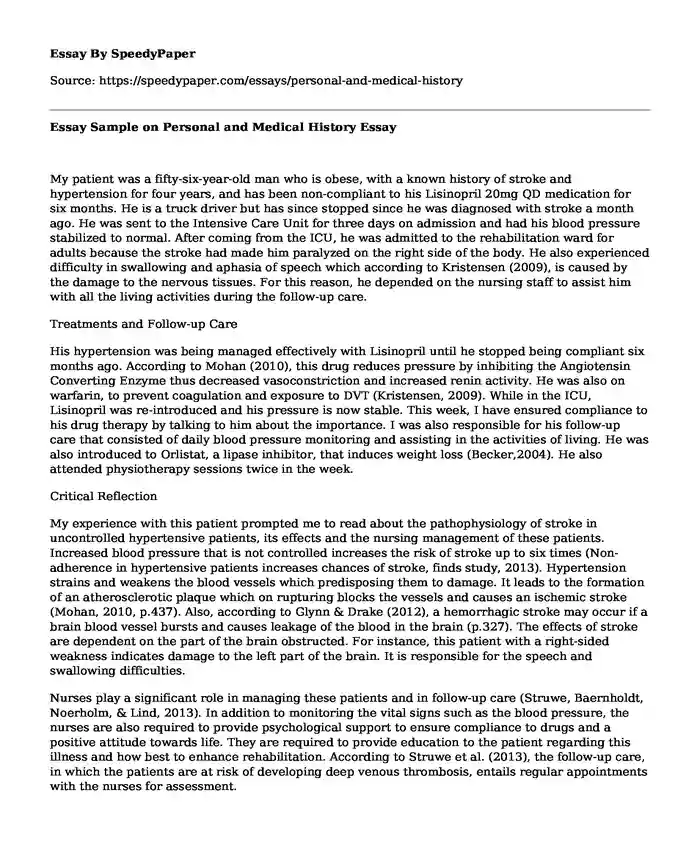
| Type of paper: | Essay |
| Categories: | Healthcare |
| Pages: | 3 |
| Wordcount: | 701 words |
My patient was a fifty-six-year-old man who is obese, with a known history of stroke and hypertension for four years, and has been non-compliant to his Lisinopril 20mg QD medication for six months. He is a truck driver but has since stopped since he was diagnosed with stroke a month ago. He was sent to the Intensive Care Unit for three days on admission and had his blood pressure stabilized to normal. After coming from the ICU, he was admitted to the rehabilitation ward for adults because the stroke had made him paralyzed on the right side of the body. He also experienced difficulty in swallowing and aphasia of speech which according to Kristensen (2009), is caused by the damage to the nervous tissues. For this reason, he depended on the nursing staff to assist him with all the living activities during the follow-up care.
Treatments and Follow-up Care
His hypertension was being managed effectively with Lisinopril until he stopped being compliant six months ago. According to Mohan (2010), this drug reduces pressure by inhibiting the Angiotensin Converting Enzyme thus decreased vasoconstriction and increased renin activity. He was also on warfarin, to prevent coagulation and exposure to DVT (Kristensen, 2009). While in the ICU, Lisinopril was re-introduced and his pressure is now stable. This week, I have ensured compliance to his drug therapy by talking to him about the importance. I was also responsible for his follow-up care that consisted of daily blood pressure monitoring and assisting in the activities of living. He was also introduced to Orlistat, a lipase inhibitor, that induces weight loss (Becker,2004). He also attended physiotherapy sessions twice in the week.
Critical Reflection
My experience with this patient prompted me to read about the pathophysiology of stroke in uncontrolled hypertensive patients, its effects and the nursing management of these patients. Increased blood pressure that is not controlled increases the risk of stroke up to six times (Non- adherence in hypertensive patients increases chances of stroke, finds study, 2013). Hypertension strains and weakens the blood vessels which predisposing them to damage. It leads to the formation of an atherosclerotic plaque which on rupturing blocks the vessels and causes an ischemic stroke (Mohan, 2010, p.437). Also, according to Glynn & Drake (2012), a hemorrhagic stroke may occur if a brain blood vessel bursts and causes leakage of the blood in the brain (p.327). The effects of stroke are dependent on the part of the brain obstructed. For instance, this patient with a right-sided weakness indicates damage to the left part of the brain. It is responsible for the speech and swallowing difficulties.
Nurses play a significant role in managing these patients and in follow-up care (Struwe, Baernholdt, Noerholm, & Lind, 2013). In addition to monitoring the vital signs such as the blood pressure, the nurses are also required to provide psychological support to ensure compliance to drugs and a positive attitude towards life. They are required to provide education to the patient regarding this illness and how best to enhance rehabilitation. According to Struwe et al. (2013), the follow-up care, in which the patients are at risk of developing deep venous thrombosis, entails regular appointments with the nurses for assessment.
I ensured a good rapport with the patient as I administered drugs to encourage compliance even after leaving the hospital. I discovered that the patient became non-compliant to Lisinopril due to ignorance when he stopped experiencing the hypertensive symptoms. I also talked to the family about his home care because he is about to be discharged now that he is stable.
References
Glynn, M. & Drake, W. (2012). Hutchisons Clinical Methods. London: Elsevier Health Sciences UK.
Mohan, H. (2010). Pathology. New Delhi: Jaypee Brothers Medical Publishers.
Non-adherence in hypertensive patients increases chances of stroke, finds study. (2013). Clinical Pharmacist. http://dx.doi.org/10.12.11/pj.2013,11123418
Becker, K. (2004). Role of Statins in the treatment and Prevention of Stroke: Introduction. Stroke, 35(11_suppl_1), 2706-2707. http://dx.doi.org/10.1161/01.str.0000143215.61714.62
Kristensen, B. (2009). HDL-CHOLESTORL, TRIGLYCERIDES AND VASCULAR COMPLICATIONS IN ESSENTIAL HYPERTENSION. Acta Medica Scandinavica, 209(S646), 31-42. http://dx.doi.org/10.1111/j.0954-6820.1981.tb02617.x
Struwe, J., Baernholdt, M., Noerholm, V., & Lind, J. (2013). How is nursing care for stroke patients organized? Nurses views on best practices. J Nurs Manag, 21(1), 141-151. http://dx.doi.org/10.1111/jonm.12016
Cite this page
Essay Sample on Personal and Medical History. (2019, Oct 16). Retrieved from https://speedypaper.net/essays/personal-and-medical-history
Request Removal
If you are the original author of this essay and no longer wish to have it published on the SpeedyPaper website, please click below to request its removal:
- Surrogacy Essay Example
- Essay Sample on Continuous Professional Development
- Free Essay on NAMA Chemicals - A Business in Saudi That Is Not Focused on Sustainability
- Essay Sample on Research Economics of European Countries
- Industrial Revolution and the Era of Nationalism and Imperialism
- Public Relations: A Century of Change. Free Essay Example
- Autobiographical Sketch for My Schizoid Personality Disorder, Free Essay
Popular categories




